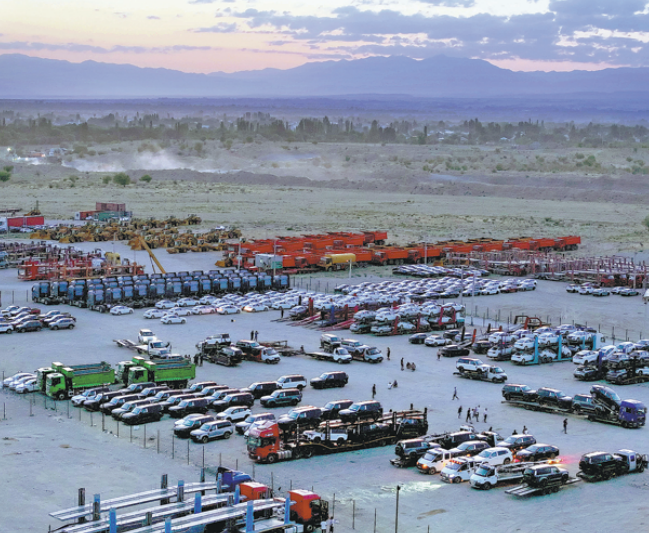China-Central Asia cooperation hits new highs


In recent years, cooperation between China and the five Central Asian countries has deepened significantly, resulting in remarkable achievements in economic and trade exchanges and rapid growth in trade volume.
In 2023, the trade value between China and these countries reached $89.4 billion, a year-on-year increase of 27 percent. Last year, that figure stood at $94.8 billion, setting a record.
This solidifies China's position as the largest trading partner and main source of investment for the five Central Asian countries, injecting new vitality into regional economic cooperation.
One of the highlights of bilateral economic and trade cooperation is the emergence of new energy vehicles as a notable growth point.
Data show that 63,000 electric passenger vehicles were exported through Khorgos Port in 2023, representing a year-on-year increase of 585.6 percent. Of these, 51,000 units were exported to the five Central Asian countries, marking a staggering growth of 608.5 percent.
This indicates that Chinese-brand NEVs are accelerating their entry into the Central Asian market, demonstrating strong market competitiveness and regional influence.
In 2019, China National Machinery Import and Export Corporation, a subsidiary of China General Technology (Group) Holding Co Ltd, and Anhui Jianghuai Automobile Group Co Ltd, jointly acquired a 51 percent stake in Allur Group, the largest automobile production and assembly enterprise in Kazakhstan.
Since then, Allur Group has achieved significant annual growth in automobile production and sales, with production volume increasing from over 9,000 vehicles in 2019 to nearly 100,000 vehicles in 2024.
Currently, Allur Group accounts for more than 60 percent of Kazakhstan's total annual vehicle production and maintains a market share consistently exceeding 40 percent.
"Spacious interior, powerful performance, smooth handling … I believe this model is highly competitive in Kazakhstan and the entire Central Asian market," Ruslan Kenjaev, deputy editor-in-chief of People's Word newspaper in Uzbekistan, said after test-driving a JAC pickup truck.
In his view, the automotive manufacturing industry is becoming a hallmark of cooperation between Central Asian countries and China. BYD has established a factory in Uzbekistan, realizing the mass production of new energy vehicles. "These capacity cooperation initiatives are benefiting Central Asian countries, and more collaborative achievements are continuously emerging," Kenjaev remarked.
In 2023, Yutong Bus, a leading Chinese bus manufacturer, secured an order from a Tashkent bus company in Uzbekistan for 800 buses.
The order included 300 electric buses and 500 natural gas-fueled ones, setting a record for China's bus exports to Uzbekistan.
It also marked the first large-scale introduction of new energy buses in the country. "We are delighted that our buses have been well-received by the people of Uzbekistan," said Yang Hu, the company's market representative for Uzbekistan.
With the deepening implementation of the Belt and Road Initiative, more Chinese automotive companies are investing in Central Asia, transitioning from simply exporting products to exporting technology and entire industry chains. This strategic shift promises to further enhance regional economic development and cooperation.

































